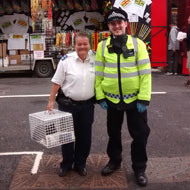
Collapsed cat found surrounded by thousands of revellers
A police officer working to keep the streets safe during Notting Hill Carnival stepped in to help a collapsed cat, who was found in the road surrounded by revellers.
Thousands of officers lined the streets of London last weekend to help carnival-goers enjoy the capital’s biggest annual event safely. But PC Curry also had his eyes peeled for any animals needing assistance.
RSPCA animal collection officer Jill Sanders said: “PC Curry was on duty on Bank Holiday Monday (27 August) when he spotted the poor puss collapsed in Wornington Road, Kensington, and knew something was wrong. She was struggling to use one of her legs and was clearly in pain so he got in touch with us.
“Police officers allowed me to drive into the pedestrianised zone so I could collect the poorly puss and get her to safety.”
The cat, who has been named Reggae by RSPCA staff, was not wearing a collar or ID tag so she is thought to be a stray. She is now being treated by veterinary staff, who believe she has feline influenza, as well as a broken leg.
ACO Sanders added: “The Met do a fabulous job every year policing our streets and work incredibly hard to make the city safe during events like Notting Hill Carnival.
“We work with them very closely on animal welfare matters and they value the safety of our four-legged friends’ almost as much as our own.
“I’d like to say a big thank you to all of the officers who helped facilitate the rescue of Reggae - by letting me drive through road closures and directing me to her location - and PC Curry for helping her get the help she needed.”
Anyone who believes Reggae may be their pet should contact the RSPCA’s Putney Animal Hospital on 0300 123 0716.
Image © RSPCA



 The latest
The latest